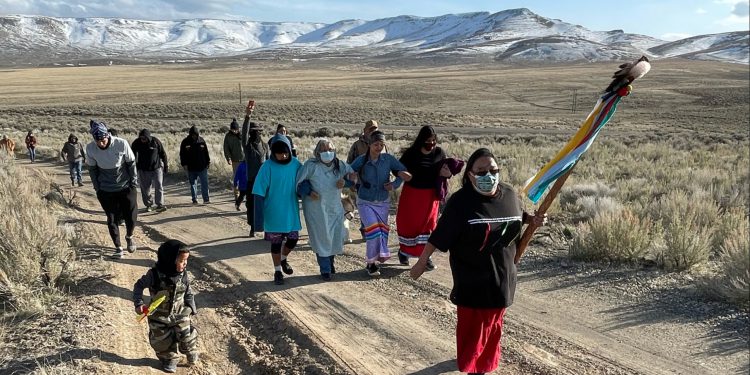A new coalition of Indigenous Peoples is calling for free, prior and informed consent to be negotiated without exception as the world transitions to clean energy.
Cultural Survival, First Peoples Worldwide, Batani Foundation, Earthworks, and the Society for Threatened Peoples launched Secure Indigenous People’s Rights in a Green Economy or SIRGE to champion a Just Transition to a low-carbon economy. They announced the partnership to coincide with International Day of the World’s Indigenous Peoples.
Kate R. Finn (Osage), Executive Director at First Peoples Worldwide said, “Partnership with Indigenous Peoples is integral to climate-resilient development.
“We must ensure that the harms driven by the fossil fuel economy are not replicated in the mineral development necessary to transition to low-carbon, clean energy projects.”
Pavel Sulyandziga (Udege), Batani Foundation, President, added, “If we do not create the human rights pre-requisites and conditions for the green economy, it can become a tragedy for Indigenous Peoples on whose lands the natural resources will be extracted.”
“Indigenous territories contain significant concentrations of untapped heavy metal reserves”
The coalition says transitioning to clean energy threatens to displace Indigenous Peoples, with almost all America’s nickel, 90 per cent of copper, 80 per cent of lithium, and almost 70 per cent of cobalt resources within 35 miles of Native American reservations.
Sixteen per cent of mining globally could impact remaining wilderness. Indigenous territories contain significant concentrations of untapped heavy metal reserves around the world, they say.
The International Energy Agency has estimated the world needs to quadruple the use of minerals such as nickel, lithium, cobalt, and copper, for clean energy technologies by 2040.
The SIRGE coalition says that as demand for transition minerals skyrockets, mining threatens Indigenous rights.
Comprehensive risk assessments and the complete participation of Indigenous Peoples who are impacted are essential. Governments and companies must implement what’s enshrined in the United Nations Declaration on the Rights of Indigenous Peoples.
They say examples of development without consent include Guatemala’s Fenix Nickel Mine on the shores of Lake Izabal. It has seen violent conflict since it was built on Indigenous land without consent in 1960 during the country’s civil war.
“Indigenous Peoples on the Taimyr Peninsula lost access to food sources after a fuel spill from a Nornickel subsidiary”
In 2007, uniformed mine personnel allegedly gang-raped at least 11 Q’eqchi women after burning their homes to evict them from their ancestral lands. In 2009, mine security opened fire on Q’eqchi land defenders protesting their eviction, killing community leader Adolfo Ich.
In 2017, Carlos Maaz Coc, a fisherman peacefully protesting the mine’s contamination of the lake, was shot and killed.
In October 2021, Guatemala’s President declared martial law and suspended civil rights in response to a peaceful blockade by Q’eqchi community members.
At the Peehee Mu’huh, or Thacker Pass, at the southern edge of the McDermitt Caldera in Humboldt County, Nevada, Lithium Americas is attempting to develop a lithium mine on lands which are sacred to Shoshone and Paiute Peoples.
And in Russia, Indigenous communities on the Taimyr Peninsula lost access to food sources after a fuel spill in 2020 from a subsidiary of Nornickel – a firm supplying 20 per cent of the world’s Class I nickel for electric vehicle batteries. Nornickel has failed to respond to requests from Indigenous communities for adequate compensation and restoration of the fragile Arctic environment.
Galina Angarova (Buryat), Cultural Survival’s Executive Director, said, “We must centre Indigenous Peoples’ and human rights as well as true, regenerative practices as we transition to the new green economy. Healthy and sustainable economies should mirror healthy ecological systems…
“A meaningful Just Transition will require improving existing standards, reforming old mining laws, mandating circular economy practices, setting standards and meeting targets for minerals’ reuse and recycling, reducing demand and accepting de-growth.”























